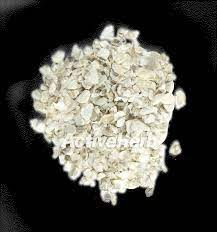Oyster shell, also known as Mother of Pearl or Zhen Zhu Mu, is a traditional Chinese herbal remedy that is derived from the shell of the oyster. In traditional Chinese medicine, oyster shell is believed to have a cooling and calming effect on the body, and is often used to treat conditions such as anxiety, insomnia, and palpitations.
Oyster shell is believed to contain a range of minerals, including calcium and magnesium, which may contribute to its medicinal effects. In addition to its use in traditional medicine, oyster shell is sometimes used as a source of calcium and other minerals in dietary supplements.
Benefits:
Calming effects: Oyster shell is believed to have a calming effect on the body and mind, which may make it useful for reducing anxiety, promoting relaxation, and improving sleep quality. It is often used as an ingredient in traditional Chinese medicine formulas for this purpose.
Digestive health: Oyster shell is also believed to have digestive-stimulating properties, which may help promote healthy digestion and relieve symptoms such as bloating, gas, and constipation. It is often used as an ingredient in traditional Chinese medicine formulas for this purpose.
Skin health: Oyster shell is used in traditional Chinese medicine to promote healthy skin. It is believed to nourish the skin and support healthy moisture levels, and is often used in formulas for conditions such as acne and eczema.
Contradictions:
Oyster shell can interact with certain medications, including thyroid medications and antibiotics, and should not be used by people taking these medications without first consulting a healthcare provider.
Oyster shell may contain contaminants, such as heavy metals, that can be harmful if consumed in large amounts or over long periods of time.
The safety of using oyster shell during pregnancy and breastfeeding has not been fully studied, and it is best to consult with a healthcare provider before using it during these times.
Oyster shell may cause allergic reactions in some people, particularly those who are allergic to shellfish.
Oyster shell can cause gastrointestinal symptoms, such as nausea, vomiting, or constipation, in some people.
Tastes LIke:
Oyster shell is typically consumed as a component of traditional Chinese medicine formulas, and as such, it does not have a distinct taste or flavor. In general, the taste of traditional Chinese medicine formulas is often described as bitter or earthy, and the taste of individual herbs may be less important than their therapeutic effects.
Preparation:
Decoction: A decoction is a strong tea made by boiling herbs in water. To prepare a decoction that includes oyster shell, place the prescribed amount of the herb and other ingredients in a pot with water, bring to a boil, and simmer for 20-30 minutes. The mixture is then strained and consumed as directed.
Powder: Oyster shell may also be ground into a powder and added to other powdered herbs to create a customized formula. The powdered herbs can be mixed with water to create a tea or taken directly in capsules or pills.
Soak in wine: Oyster shell can also be soaked in rice wine for several weeks and consumed as a tonic. To prepare, add the shell to a jar or bottle of rice wine and let it sit for several weeks. The resulting tonic can be consumed as directed.


